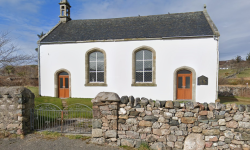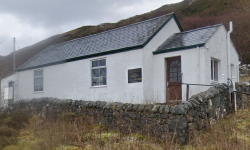Alexander Munro of Durness
Alexander Munro was the pioneer minister of northwest Sutherland. He was born about 1579, the son of a dyer, Hector Munro of Milntown of Katewell, near Kiltearn, Ross-shire. In common with many other Highlanders, he benefited greatly from the unjust banishment of the Rev Robert Bruce from Edinburgh to Inverness by King James VI. Concerning which, John Brand, in 1700, wrote that: “The memory of that man of God, Mr Robert Bruce, is sweet to this day in this place. In the days of King James he was confined in this town, where the Lord blessed his labours to the conversion of many brethren in the town and country round about, for multitudes of all ranks would have crossed ferries every day to hear him. They came both from Ross and Sutherland.”1 John Livingston, himself a celebrated preacher, said: “Robert Bruce I severall times heard, and in my opinion never man spake with greater power since the apostles’ dayes.”
Munro was amongst those many converts in Inverness. Shortly thereafter he had a remarkable call to the ministry, as his source related to Wodrow: “he had an immediate voice from heaven calling him to betake himself to the ministry and telling him he behoved to be Minister at Durness, a most wild place a parish fifty miles in length, where the Gospel had never been and the people were almost mere heathens then. This he had several times repeated to him and after long exercise about it in secret he acquainted some ministers with it and was entered on trial, licensed and ordained Minister at Durness.”2 He was a teacher in Strathnaver, whether before, during or after he trained for the the ministry is unclear3. He studied at the University of Aberdeen and is said to have, “made very rapid progress in all his studies.”4 He was entered on trials, and licensed and ordained. The year is given in the History of the Munros as 1620 but in the Fasti (vol 7) as 1634.
There was an exhorter, John Reid, appointed to Durness as early as 1567. Whatever religious instruction the people of Durness had received prior to his coming, Munro found them to be ignorant of true religion and without the means to acquaint themselves with the scriptures. He recognised that their means of communicating oral tradition was via song which they repeated, or in some cases, composed. Of the Durness gaelic poet of the 18th century, Rob Donn, his biographer, Dr Mackintosh Mackay, wrote: “His mother’s talents are known to have been more than ordinarily high. We say ordinarily, for at that time, and in that Country, mostly all were given to the practice of poetry, and there were few but could compose a verse on occasion. The bard’s mother was remarkable for the recital of Ossian’s poems, and the other ancient minstrelsy of the land.”5 This was the means, the common practice of the people, that Munro used, in an earlier age, to initiate the parish of Durness into the great truths of scripture. The verses he composed became known as Sandy Munro’s verses, fragments of which have been preserved, incorporated into a collection of gaelic verse, known as the Fernaig manuscript, which was compiled in 1688 by Duncan Macrae. Two of Munro’s verses, amonsgt the eighty lines altogether, are quoted by Professor D. Mackinnon6:
Sadrach, Mesach, Abednego,
Do dhealbhaibh bréig’ nach ìsl’eadh,
Dhion ‘s an àmhuinn bha gu gràineil,
Triuir’s ‘n aireamh t’ fhìrinn.
Claon toil m’ fheol’, mo bheatha, ‘s m’ òig’,
Saoghal fòs, ‘s na deamhnaidh,
Stri gu calma, sìor chlaoidh m’ anma,
Chaoidh gu damnadh siorruidh.
Munro’s labours in Durness were richly blessed. It was related to Wodrow that Munro “had great success and a large harvest of souls.” There were reputedly contemporary records of the Presbytery of Dingwall which recorded this but these, which would have been amongst the earliest records of that Presbytery, are not extant. Rev D. Beaton wrote that Mr Munro “found his parish a spiritual desolation and a wilderness when he came to it, but under the blessing of the Spirit and a notably consecrated life, a great change came over the people.”7
In common with other pioneering ministers such as Aenas Sage, and Alexander Pope, Munro laboured in a region which was wild and lawless. The following grim tale is told of how he hazarded his life to bring the gospel to sinners:
The district over which the minister of those days had oversight being so very extensive, he often took up his abode, for months at a time, at its either extremity. Mr. Alexander Munro being on one of these occasions entertained at Tongue by Sir Donald Mackay, – afterwards the first Lord Reay – was called upon in the course of duty to visit some district to the west. Such were the times, that Lord Reay did not consider even the messenger of peace safe without an armed attendant. Mr. Munro, however, did his work unmolested, until on his return journey he came to the river Hope, beside which there lived a noted character of that period – a Donald MacLeod, who is better known as Donald ‘Ic Mhorchaidh ‘Ic Ian mhòr. This man, now in extreme old age, had been a powerful and lawless ruffian, whose hands were stained with the blood of no fewer, it is said, than eighteen murders. To us now it seems unaccountable, almost inconceivable, that any country or condition of society could bear for any time the tyranny of such a fiend in their midst. But he was a convenient tool in the hands of others, who were equally bloody-minded, though they took care not to appear so outwardly. Mr. Munro felt it his duty to speak to this lost and lawless sinner, if so be he might lead him in his old age to some sense of his sin, to repentance, and to the knowledge of the Saviour. Instead, however, of this, Donald took deadly offence at being so spoken to, and were it not that the infirmities of age and the fear of an armed attendant prevented, he would as readily have shed the blood of the evangelist as he did that of his many former victims. Donald’s two sons – men of physique and spirit akin to his own – were absent. On their return, the father charged them instantly to follow the minister, and not show face in his presence without the heart of him who so insulted him. They went in pursuit, but on nearing Mr. Munro they were challenged by his attendant, who was armed with a match-lock, whereas they had none, so they thought discretion the better part of valour. Fearing their father even more than the matchlock, they killed a sheep, and took with them its heart, which they presented to him instead of the minister’s. He viewed it attentively, and said, “Ah well! I always thought the Munroes cowards, but never knew until now that they had the heart of a sheep.”8
Alexander Munro died before the 22nd of 1653 — the date his youngest son Hugh received a gaelic bursary from the Presbytery of Dingwall, when the record states his father was deceased.9 He had five children including three sons, John who became minister in Alness, Donald who became a teacher in Alness, and Hugh who became the successor to his father as the minister of Durness.
Rev J.S. Mackay argued that Munro’s use of religious poetry, which proved a blessing to the people, justifies the use of hymns of human composition in the church – a subject which was very much to the fore when he wrote his religious history of the Reay Country in 1897, having then been introduced into the Free Church which was drifting away from its historical roots. His reasoning is unsound, for we do not know that Alexander Munro used the verses for anything other than instruction. In this regard, Prof. Mackinnon wrote of the Fernaig manuscript: “The religious poems, which comprise about one-half of the whole, are creditable performances; but they do not attain to very high poetical merit. They might be described as short sermons in verse, put into this form for the religious instruction of the people.” The metrical psalms in gaelic were not available until the Synod of Argyll produced the first fifty in 1659, a few years after Munro’s death. He would not therefore have a manual of gaelic praise to use in worship, but inferring that he used his own verse is pure speculation. More likely he would have used the English metrical psalms as was a common practice in gaelic speaking areas in the seventeenth century.10
Munro’s call to the ministry was truly extraordinary and probably unparalleled in Highland history. Nevertheless it was not inconsistent with the extraordinary experience of Robert Bruce himself. Might we not say that Munro, having a great work before him, something of the mantle of his father in Christ was put upon him. Like Bruce, albeit to a lesser extent, he was an instrument of great good, being used by the Lord to lay a foundation of piety in the parish of Durness that would last many generations.
Footnotes
1. Quoted in Douglas W.B. Somerset, Scottish Reformation Society Historical Journal, 2 (2012), 43-84.
2. Wodrow Analecta.
3. Fasti vol 7.
4. J. S. Mackay, Religious history of the Reay Country after the Reformation, in: Sutherland and The Reay Country.
5. R. Mackay, Songs and Poems in the Gaelic Language, ed. M. Mackay, Inverness, 1829.
6. The Fernaig Manuscript, Trans. Gaelic Soc. Inverness vol 11, p329.
7. The Covenanters in the Far North, D. Beaton, Free Presbyterian Magazine, March 1909, vol 13(11): 433-435.
8. J. S. Mackay.
9. J.S. Mackay gives the year of death as 1643 but gives no source.
10. “The General Assembly of this National Church, taking into consideration that there is a complete Paraphrase of the whole Psalms in Irish metre, approven and emitted by the Synod of Argyle, who understand the Irish [gaelic] language; conform to an Act of the General Assembly 1690; together with a translation of the Shorter Catechism of this Church in Irish, bound with the said Psalms, in one volume, and the General Assembly understanding that in some parts of this National Church, where preaching and prayer are used in Irish; the Psalms are sung at the same diet in a different language, whereby an uniformity in the worship is marred, and many of the people deprived of the benefit of praising God in a known tongue. Therefore, as the General Assembly doth hereby appoint that this incongruous way of worshipping God shall be hereafter forborne, so they do recommend to all congregations and families who worship God in the Irish language, to make use of the said Paraphrase therein; and also to make use of the foresaid translation of the Shorter Catechism, as an uniform means of catechising the people.” 17 April 1694 from the ACTS OF ASSEMBLY, 1694.

